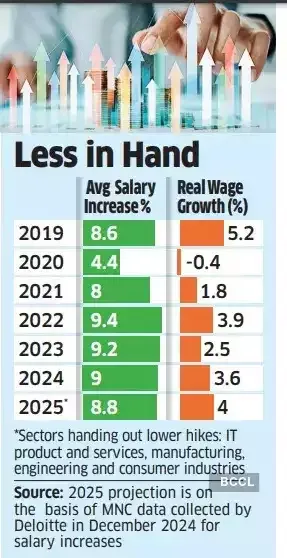Kolkata|Bengaluru: Inflation and muted average annual salary increases by India Inc. have resulted in the change in real wages for most employees ranging from -0.4% to 3.9% over the last five years, according to data collated by Deloitte for ET. This has hit disposable income and consumption, and the scenario is unlikely to change much in 2025.
The study calculated real wage growth after factoring in inflation based on the Consumer Price Index against average salary hikes by companies. In 2025, Deloitte said real wage growth is projected to improve marginally at 4% compared with 3.6% in 2024 due to moderation in inflation. Salary hikes for 2025 are likely to be slightly lower than last year. This is still below real wage growth in the pre-Covid period, such as 5.2% in 2019.
“With companies giving most of their employee salary hikes to the tune of inflation or marginally more, and best performers receiving only 1-3 percentage points more, it has been impacting people’s ability to spend,” said
Pradeep Bakshi, managing director at Voltas, the Tata-owned appliance manufacturer. “As a result, consumers are only resorting to need-based purchases and holding back discretionary spending which was prevalent before Covid.

According to a recent ET report, based on exclusive survey data from Deloitte, multinationals in India that follow the January-December performance cycle, are issuing flat to slightly lower salary increments for 2025--average pay hikes are at about 8.8% compared with actuals of 9% in 2024. Sectors such as IT product and services, manufacturing, engineering and consumer were among those that will have lower hikes. To be sure, inflation is trending down, which will improve real wage growth this year. Pay increases have only been marginally more than the inflation rate over the last few years, said Anandorup Ghose, partner at Deloitte India. “And as this gap narrows, the real earnings and therefore buying power for employees, particularly those who are at the lower salary bands gets more squeezed,” he said.
“This lowering of average increases also has a psychological impact as the perception of inflation is always much higher than official rates–so there is a larger belief that buying power has been negated.” “Middle-class consumers are the ones struggling the most,” said value fashion retailer V-Mart Retail managing director Lalit Agarwal. “They have downgraded their lifestyles, taken loans and are not getting sufficient salary hikes or job promotions."
Budget with ET
Before Budget, Raghuram Rajan is worried about the big Indian middle class
How cities can drive India's sustainable urban development goal forward
Budget 2025 needs to help global electronic makers plan life outside China
“With companies giving most of their employee salary hikes to the tune of inflation or marginally more, and best performers receiving only 1-3 percentage points more, it has been impacting people’s ability to spend,” said
Pradeep Bakshi, managing director at Voltas, the Tata-owned appliance manufacturer. “As a result, consumers are only resorting to need-based purchases and holding back discretionary spending which was prevalent before Covid.

According to a recent ET report, based on exclusive survey data from Deloitte, multinationals in India that follow the January-December performance cycle, are issuing flat to slightly lower salary increments for 2025--average pay hikes are at about 8.8% compared with actuals of 9% in 2024. Sectors such as IT product and services, manufacturing, engineering and consumer were among those that will have lower hikes. To be sure, inflation is trending down, which will improve real wage growth this year. Pay increases have only been marginally more than the inflation rate over the last few years, said Anandorup Ghose, partner at Deloitte India. “And as this gap narrows, the real earnings and therefore buying power for employees, particularly those who are at the lower salary bands gets more squeezed,” he said.
“This lowering of average increases also has a psychological impact as the perception of inflation is always much higher than official rates–so there is a larger belief that buying power has been negated.” “Middle-class consumers are the ones struggling the most,” said value fashion retailer V-Mart Retail managing director Lalit Agarwal. “They have downgraded their lifestyles, taken loans and are not getting sufficient salary hikes or job promotions."








